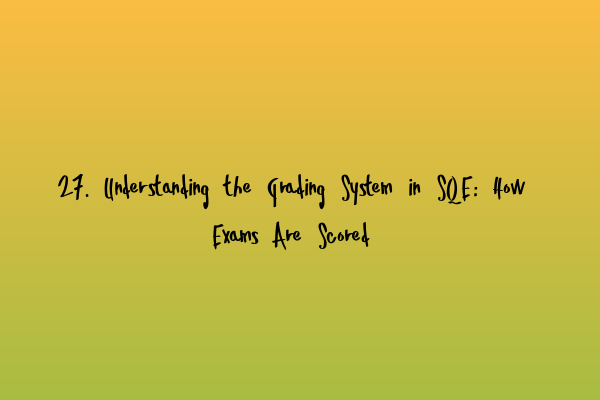27. Understanding the Grading System in SQE: How Exams Are Scored
As you embark on your journey to become a qualified solicitor, it is essential to familiarize yourself with the grading system used in the Solicitors Qualifying Examination (SQE). Understanding how exams are scored can not only help you set realistic expectations but also enable you to develop effective study strategies to maximize your chances of success. In this blog post, we will delve into the details of the grading system in SQE and shed light on how exams are scored.
Grading System in SQE
The SQE employs a pass/fail system, meaning there are no numerical or letter grades assigned to individual exams. Instead, the focus is on assessing whether candidates have demonstrated the necessary competencies required to practice as a solicitor. This approach is designed to ensure that candidates possess the requisite skills and knowledge to handle real-life legal scenarios effectively.
The SQE is divided into two stages: SQE1 and SQE2. Both stages assess different aspects of a candidate’s ability and are scored independently. It is important to note that while a passing score is required in both stages to qualify as a solicitor, the scores obtained in each stage do not contribute towards an overall grade.
SQE1 Grading
SQE1 focuses on assessing the foundational knowledge of law, including subjects such as Constitutional and Administrative Law, Contract Law, and Criminal Law. This stage consists of multiple-choice questions (MCQs) and is scored on a pass/fail basis. To pass SQE1, candidates must achieve the minimum competency standard set by the Solicitors Regulation Authority (SRA).
To excel in SQE1, it is crucial to develop effective strategies for tackling MCQs. Strategies to Tackle SQE MCQs: Mastering Multiple-Choice Questions offers valuable insights and techniques to help you navigate this stage with confidence.
SQE2 Grading
SQE2 assesses a candidate’s ability to apply legal knowledge to practical scenarios. This stage revolves around skills-based tasks, including client interviewing, advocacy, legal research, legal drafting, and case and matter analysis. SQE2 is also scored on a pass/fail basis, without any numerical or letter grades assigned to individual tasks.
To excel in SQE2, it is vital to develop strong problem-solving and analytical skills. Scenario-Based Questions in SQE2: Become a Master Problem-Solver provides valuable guidance on how to approach and excel in these skills-based tasks.
How Exams are Scored
While SQE exams do not use traditional grades, it is important to understand how your performance is evaluated. Each question in SQE1 and each task in SQE2 is carefully crafted and mapped to specific legal competencies. Assessors use a set of predetermined criteria and marking schemes to evaluate each response or task.
In SQE1, for example, MCQs are marked based on a predetermined set of correct answers. Each question carries equal weight, and the overall score is determined by the total number of correct responses. To pass SQE1, candidates must meet the minimum competency standard, ensuring that they have a strong foundation in the core areas of law.
In SQE2, assessors evaluate candidates’ responses based on the application of legal knowledge, logical reasoning, analysis, and problem-solving skills. Each task is assessed using a detailed marking scheme designed to capture the complexity and quality of the response. To pass SQE2, candidates must demonstrate a satisfactory level of competence in each assessed skill.
As you prepare for the SQE exams, it is crucial to familiarize yourself with the expectations and criteria used to assess your performance. Understanding the marking schemes and criteria can help you tailor your study approach and focus on areas where you may need additional practice and improvement.
Conclusion
Becoming acquainted with the grading system in SQE is an important step in your preparation for the solicitors qualifying examination. Remember that the focus of the SQE is to assess your competency and ability to practice as a solicitor, rather than assigning traditional grades. By understanding how exams are scored, you can develop effective study strategies and approach your exams with confidence.
To enhance your SQE preparation further, we recommend exploring the following articles:
– Demystifying the SQE Exam Pattern: Knowing What to Expect
– SQE Strategies: Proven Tactics to Ace the Solicitors Qualifying Examination
– SQE Case Studies: Applying Knowledge in Real-Life Scenarios
Best of luck with your SQE journey, and may you achieve success in your pursuit of becoming a qualified solicitor!
